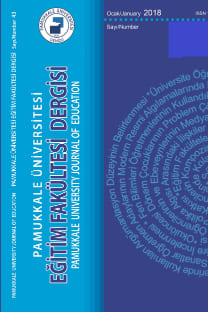Anne ve Babaların Oyuna Katılımı
Erken çocukluk döneminde oyun, çocuğun gelişim ve eğitimini desteklemekte önemli bir yere sahiptir Bu çalışmada, anne ve babaların çocuklarının oyunlarına katılım düzeyleri ve onların katılımını etkileyen faktörler incelenmiştir.Çalışmanın örneklemini Denizli ili merkezinde anaokulu ve anasınıfı çocuğu olan 331 anne ve baba oluşturmaktadır. Veriler oyuna katılım anketi kullanılarak toplanmıştır. Verilerin analizi sonucunda anne babaların oyuna katılımı üzerinde eğitim düzeyi, çalışma durumu, cinsiyeti, çocuk cinsiyeti, yaşı ve sayısının etkili olduğu saptanmıştır. Çalışmanın bulguları alan yazın ışığında tartışılmış ve öneriler sunulmuştur.
Mothers and Fathers' Participation in Play
Play in early childhood period has a very important role in children’s development and education. In this study, mothers and fathers’ level of participation in their children’s play and factors influencing their participation is investigated. The sample of this study consisted of 331 mothers and fathers who have children attending preschools and kindergartens in central Denizli. Data were gathered by using the parents’ participation in play questionnaire. The results of data analysis showed that mothers and fathers’ level of education, working status, gender, child gender, age and number of children influenced their participation in play. The results were discussed in relation to the related literature and suggestions were presented.
___
- Aral, N., Gürsoy, F., ve Köksal, A. (2001). Okul öncesi eğitiminde oyun. İstanbul: YA-PA.
- Craig, L. (2006). Parental education, time in paid work and time with children: An Australian time-diary analysis. The British Journal of Sociology, 57(4), 553-575.
- Denizli il milli eğitim müdürlüğü. (2006). 2006-2007 yılı eğitim- öğretim yılı sayısal bilgiler. Milli Eğitim Müdürlüğü: Denizli.
- Elkind, D. (1995). Ties that stres: The new family imbalance. MA: Harward University Press.
- Fagot, B. I., ve Hagan, R. (1991). Observations of parent reactions to sex-stereotyped behaviors: Age and sex effects. Child Development, 62, 617–628.
- Fogle, L. M. ve Mendez, J. L.(2006). Assessing the play beliefs of African American mothers with preschool children. Early Childhood Research Quarterly, (21),4, 507-518.
- Garborino, J. (1989). An ecological perspective on the role of play in child development. (Edit: M. N. Bloch ve A. D. Pellegrini). The Ecological Context of Children's Play. NJ: Ablex Publishing Corporation.
- Goldberg, W.A., Clarke-Stewart, K. A., Rice, J. A. ve Delis, E. (2002). Emotional energy as an explanatory construct for fathers’ engagement with their infants. Parenting Science and Practice, 2(4), 379-408.
- Haight, W. L., Parke, R. D., ve Black, J. E. (1997). Mothers’ and fathers’ beliefs about and spontaneous participation in their toddlers’ pretend play. Merrill-Palmer Quarterly, 43(2), 270-290.
- Haight, W. L., Wang, X., Fung, H. H., Williams, K. ve Mintz, J. (1999). Universal, developmental and variable aspects of young children’s play: A cross-cultural comparison of pretending at home. Child Development, 70(6), 1477-1488.
- Johnson, J. E., Christie, J. F. ve Wardle, F. (2005). Play, development, and early education. New York: Allyn and Bacon.
- Kağıtçıbaşı, C. (1996). Family and human development across cultures: A view from the other side. New Jersey: Lawrence Erlbaum.
- Kağıtçıbaşı, Ç. (1999). Early learning and human development: The Turkish early enrichment program. Global Perspectives on Early Childhood Education. Proceedings from the Global Perspectives on Early Childhood Education Workshop.
- Kağıtçıbaşı, C. ve Ataca, B. (2005). Value of children and family change: A three-decade portrait from Turkey. Applied Psychology: An International Review, 54(3), 317–337.
- Karasar, N. (2002). Bilimsel araştırma yöntemi. Ankara: Nobel.
- Lindsey, E. W. ve Mize, J. (2001). Contextual differences in parent–child play: Implications for children’s gender role development. Sex Roles, 44(3/4), 155-176.
- Roggman, L.A., Fitzgerald, H.E., Bradley, R.H., ve Raikes, H. (2002). Overview of methodological, measurement, and design issues in studying fathers: An interdisciplinary perspective. In C.S. Tamis-LeMonda & N. Cabrera (Eds.), Handbook of father involvement: Multidisciplinary perspectives (ss. 1–30). Hillsday, NJ: Erlbaum.
- Tamis-LeMonda, C.S., Shannon, J.D., Cabrera, N. J., ve Lamb, M. E. (2004) Fathers and mothers at play with their 2- and 3-year-olds: Contributions to language and cognitive development. Child Development, 75 (6), 1806 – 1820.
- Wood, E., Desmarais, S., ve Gugula, S. (2002). The impact of parenting experience on gender stereotyped toy play of children. Sex Roles, 47(1/2), 39-49.
- Yeung, W. J.; Sandberg, J. F.; Davis-Kean, P. E.; ve Hoffferth, S. L.(2001). Children’s time with fathers in intact families. Journal of Marriage and Family, 63, 136-154.
- ISSN: 1301-0085
- Yayın Aralığı: Yılda 3 Sayı
- Başlangıç: 1996
- Yayıncı: -
Sayıdaki Diğer Makaleler
Göreve Dayalı Öğrenme Yönteminin Yabancı Dil Olarak Türkçe Öğretimine Uygulanmasına İlişkin Sorunlar
Liselerde Yaşanan Şiddet Olaylarının Nedenleri ve Çözüm Önerileri (Denizli İli Örneği)
Fatma ÇOBANOĞLU, İlknur ŞENTÜRK, Devran KIRAN
Probleme Dayalı Öğrenme ve Matematik Eğitiminde Uygulanabilirliği
Abdurrahman TANRIÖĞEN, Ramazan BAŞTÜRK
Anne ve Babaların Oyuna Katılımı
Nesrin IŞIKOĞLU, Asiye İVRENDİ BORA
Üniversite Öğrencilerinde Sanatsal Benlik Kavramının Bedensel Rahatsızlıklar Üzerindeki Etkisi
İlköğretim Öğrencilerinin Fizik Kavramlarını Günlük Yaşamla İlişkilendirme Düzeyleri
